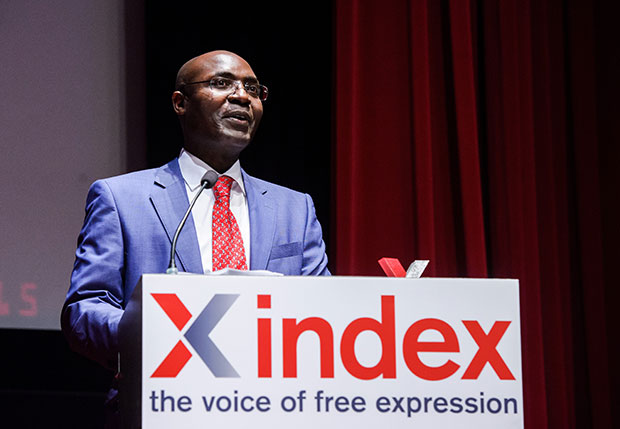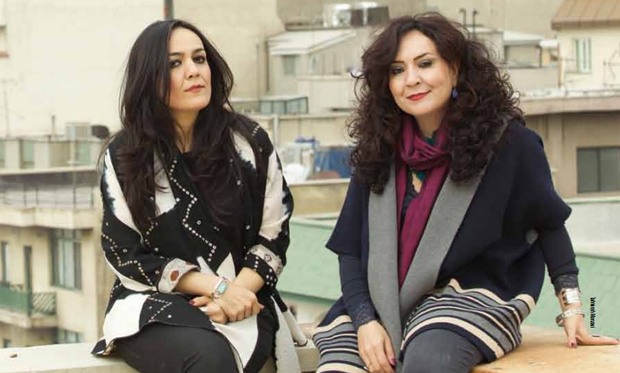27 May 2015 | Events, mobile
Panel discussion including acclaimed singers and a past Index on Censorship Freedom of Expression Award winner Mahsa and Marjan Vahdat alongside Natalia Koliada, co-founder of Belarus Free Theatre, and Lisa Peschel of the University of York who has recently rediscovered extensive archival material of performances, scripts and revues performed in the Nazi ghetto Terezinstadt. The event will be chaired by Julia Farrington of Index on Censorship.
The panel will be asked to explore from their personal and political perspective different aspects of freedom of expression in repressive regimes; the interface between artistic inspiration and life in repressive regimes, and the role of the media in terms of raising awareness of the increasing restrictions placed on artists to curb freedom of expression.
When: Saturday 6 June 2015, 5.00pm to 6.15pm
Where: National Centre for Early Music, Walmgate, YO1 9TL (map)
Tickets: Free admission. Booking required. Additional information: 01904 658338.
27 May 2015 | About Index, Campaigns, News, Statements
The new UK government’s plans to tackle extremism and introduce a British bill of rights, as outlined in the Queen’s Speech on 27 May, raise the stakes significantly for freedom of expression in the United Kingdom.
“The government’s plans to introduce a Snoopers’ Charter, introduce new extremism laws and introduce a yet-to-be-determined bill of rights, all present a serious risk to civil liberties in Britain.
“We see no need for the introduction of new legislation in these areas: current laws on incitement to violence and hatred can already be applied to extremist individuals or groups. The new plans won’t stop terrorism, they will simply stifle free speech,” Index on Censorship CEO Jodie Ginsberg said.
Under the proposed extremism bill, extremists would be banned from TV and stricter controls imposed on what can be said on the internet. The proposed law would be applied to those seeking to undermine vaguely defined “British values”, and is a broad brush that could end up being applied to anyone who simply disagrees with the government.
The government’s plans for the proposed British bill of rights aims to undo the “damaging effects of Labour’s Human Rights Act” of 1998, according to a government briefing pack on the Queen’s Speech. According to The Times, the move against the Human Rights Act will be delayed while the government undertakes a consultation on draft legislation.
Index remains convinced that driving debate underground is not the answer in tackling extremism or terrorism.
26 May 2015 | Angola, mobile, News, Statements

Journalist and human rights activist Rafael Marques de Morais (Photo: Alex Brenner for Index on Censorship)
Index is appalled to learn that a decision to pursue a conviction of Index award winning investigative journalist Rafael Marques de Morais is moving forward despite apparent agreement between the parties.
Last week, a court in Angola indicated that libel charges against the anti-corruption campaigner would be dropped, but on Monday 25 May 2015 the public prosecutor said he would proceed with a conviction.
“This backtracking by Angola in the case of Rafael Marques de Morais is outrageous,” said Index on Censorship CEO Jodie Ginsberg. “Rafael’s investigations into human rights abuses in Angola are crucial and should not be impeded.”
On Monday 25 May, Marques said he felt “tricked” in the wake of last week’s deal he had secured with the generals, according to AFP.
“After all this, the state asks that I be sentenced, saying that I had failed to give evidence,” Marques was quoted as saying as he left the courtroom.
David Mendes, Marques de Morais’ lawyer, told AFP that the prosecution is seeking a one-month suspended sentence despite the agreement between the parties. The verdict in the case is expected 28 May.
The new developments are the latest twist in the case against Marques de Morais, who was being sued for libel by a group of generals in connection to his work exposing corruption and serious human rights violations connected to the diamond trade in his native Angola.
The case was directly linked to Marques de Morais’ 2011 book Blood Diamonds: Torture and Corruption in Angola. In it, he recounted 500 cases of torture and 100 murders of villagers living near diamond mines, carried out by private security companies and military officials. He filed charges of crimes against humanity against seven generals, holding them morally responsible for atrocities committed. After his case was dropped by the prosecution, the generals retaliated with a series of libel lawsuits in Angola and Portugal.
Marques de Morais originally faced nine charges of defamation, but on his first court appearance on 23 March was handed down an additional 15 charges. The proceedings were marked by heavy police presence, and five people were arrested. The trial opened just days after he was named joint winner of the 2015 Index Award for journalism.
The parties had been negotiating to try and find some “common ground”, Marques de Morais told Index in late April, but the talks broke down. His case was postponed to 14 May while the talks were ongoing.
The resumption of the trial came amid allegations of a massacre of members of a religious sect that Marques de Morais reported on for The Guardian. MakaAngola, Marques de Morais’ investigative journalism site, was knocked offline for a short period after The Guardian article.
This article was posted on 26 May 2015 at indexoncensorship.org
22 May 2015 | Campaigns, Europe and Central Asia, mobile, Statements, United Kingdom
Britain’s Home Secretary, Theresa May, would — apparently — like to pre-approve programmes before broadcast that may include “extremist” content. We know this thanks to a leaked letter to the prime minister from the former Culture Secretary Sajid Javid who expressed his objection to the plans of his fellow cabinet minister.
Javid pointed out, quite rightly, that such a move could (and would) have a damaging effect on free speech — a freedom that David Cameron himself identified earlier this month as being part of the “British values” he wants to protect (values and freedoms that are systematically being attacked by the current government though proposed measures such as the Snoopers Charter and planned abolition of the Human Rights Act).
The world’s most repressive regimes largely have no need to pre-vet content. This is simply because they control all media outlets, and thus the messaging of the broadcasts and press. Why bother pre-vetting content when you’ve decided everything that goes out in the first place. If you can’t do that, pre-vetting is the next best step for an authoritarian government. China, which has one of the most sophisticated and far-reaching censorship regimes in the world, pre-censors TV documentaries, as well as non-fiction films, and has strict guidelines for broadcasters — including online companies — that forces them to self-censor huge swathes of content. Burma, whose military dictatorship finally ended in 2011, had pre-publication censorship for more than four decades.
As Javid himself notes in his letter: “It should be noted that other countries with a pre-transmission regulatory regime are not known for their compliance with rights relating to freedom of expression and government may not wish to be associated with such regimes.”
Yet with every step Theresa May makes she seems — under the guise of protecting our national security — to be bringing us closer and closer to the practices of countries who restrict the rights of their citizens to speak openly, countries who spy on their people indiscriminately, and countries who issue vague and obscure directives about the kinds of people and opinions deemed “unacceptable”.
We already have plenty of laws in Britain dealing with incitement to violence and the promotion of terrorism. We also have strict broadcasting rules addressing these areas. But the idea that the government should have a role in assessing content before it is broadcast, or in developing lists of speakers banned, not for inciting violence or hatred, but because their ideas are extreme, should set alarm bells ringing.
This article was posted on 22 May 2015 at indexoncensorship.org



